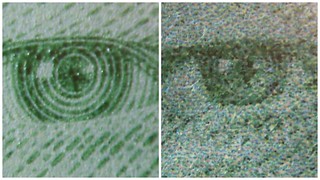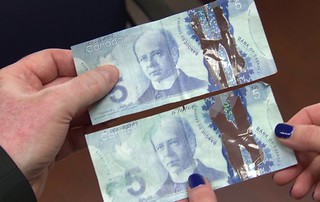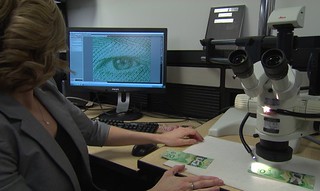
PREV ARTICLE
NEXT ARTICLE
FULL ISSUE
PREV FULL ISSUE
CANADA'S POLYMER NOTES THWARTING COUNTERFEITERS
CBC News published a wonderful article on January 13, 2016 about the current state of counterfeiting in Canada, now that the
switch to polymer notes is underway. Here's an excerpt, but be sure to read the complete article online. -Editor
That doesn't mean people have given up trying to copy Canada's banknotes — it's just that even their best attempts to make fake cash are falling well short. Regina Police Const. Scott Wolfe hasn't seen much counterfeit currency since the Bank of Canada introduced polymer money four years ago, but he did have a case last fall. "When we first touched the bill you could tell it wasn't the polymer feel. It was paper. We could see they had cut out the security window from a real $5 bill and pasted it to a $50 and $100 bill," said Wolfe. The face in the hologram didn't match the face on the bill and the edges were uneven. Even so, the money was successfully passed on to retailers, perhaps in a dimly lit bar or sandwiched between two authentic notes.
"Generally we're seeing a poor to medium-quality counterfeit note," said Robert Moyes, examiner of counterfeit for the RCMP. About 10 years ago, when counterfeiting was at its height in Canada, Moyes said, his lab would receive up to 45,000 notes every month. In December, Moyes said, the lab received 1,500 bills and many were copies of older-series paper notes, which are easier to fake. "It's more of a challenge to the counterfeiter to produce these [new banknotes] and the simulation of the security features has been very poor," said Moyes. Most of the counterfeit polymer bills are printed on paper. Some used paper with a waxy or plastic coating. A few bills look passable from a distance, but up close are too shiny and slippery. Several $5 bills at the bureau feature strips of glittery wrapping paper taped to transparent plastic strips in a crude attempt to simulate security holograms. Moyes said others go a step further by buying holographic sheets from shops in China. Shipments of the holographic sheets have even been seized by the Canada Border Services Agency. All of the bills received by the bureau are examined by specialists under microscopes and different sources of light. When a technician puts a genuine $50 bill under a high-powered microscope, the image of an eyeball comes up on a large computer screen. It's easy to see several security features, including the fine detail of raised red ink from an engraved plate. Even though that feature can only be seen under a microscope, it's something you can feel under your fingertips or by running a fingernail across the bill. "It's got life to it. There's a tactility," Moyes said, adding that just the "feel" of a bill is one of the best ways a regular person can detect a fake. When the genuine $50 bill is replaced under the microscope with a fake, it appears muddy on the screen. "This is the eyeball — you can see the lack of line work, resolution. And in some cases, if it's toner, it flakes right off," Moyes points out. 
Love the glittery wrapping paper solution. If only these people were so creative about finding productive work for themselves. -Editor
To read the complete article, see:
Wayne Homren, Editor The Numismatic Bibliomania Society is a non-profit organization promoting numismatic literature. See our web site at coinbooks.org. To submit items for publication in The E-Sylum, write to the Editor at this address: whomren@gmail.com To subscribe go to: https://my.binhost.com/lists/listinfo/esylum All Rights Reserved. NBS Home Page Contact the NBS webmaster 
|

